What are some of the most common related services used in schools?
Page 10: Other Related Services in Schools
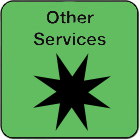 Because related services are individualized services that are responsive to the unique needs of each student with a disability, the federal government does not provide a specific list of approved related services. It is impossible to include an exhaustive list. The previous pages highlighted some commonly used related services in school settings. A brief description of other commonly used related services is below.
Because related services are individualized services that are responsive to the unique needs of each student with a disability, the federal government does not provide a specific list of approved related services. It is impossible to include an exhaustive list. The previous pages highlighted some commonly used related services in school settings. A brief description of other commonly used related services is below.
Assistive Technology (AT)
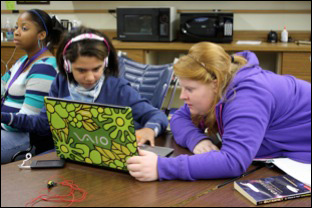 Assistive technology (AT) is a service that helps a student with a disability to meet his or her individualized education program (IEP) goals and to access and participate in the general education setting to the greatest possible extent. IEP teams must consider assistive technology (both devices and services) for every student who has a disability. Services might include:
Assistive technology (AT) is a service that helps a student with a disability to meet his or her individualized education program (IEP) goals and to access and participate in the general education setting to the greatest possible extent. IEP teams must consider assistive technology (both devices and services) for every student who has a disability. Services might include:
- Evaluating the student’s need for a device
- Buying, leasing, or acquiring the device
- Selecting, fitting, adapting, repairing, or replacing the device as needed
- Coordinating the services for a student who uses a device (e.g., therapies, education)
- Providing training or technical assistance to the student, family, teachers, or others involved in the use of the device
For more information on assistive technology view the following IRIS Module:
Audiology Services
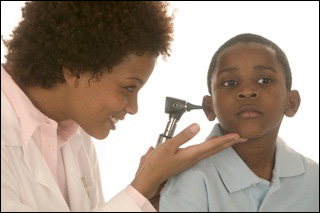 A school audiologist helps a student with hearing loss or an auditory processing disorder to access classroom curriculum. Audiologists are trained to provide a variety of services, such as fitting and maintaining technology (e.g., FM systems); providing in-service training, consulting, and guidance to support personnel, teachers, and families; participation in IEP meetings; diagnosing or assessing hearing loss and auditory processing disorders; troubleshooting or executing minor hearing aid repairs; assessing students’ functional classroom performance; conducting a hearing screening; and assessing classroom acoustics for students who have hearing disorders.
A school audiologist helps a student with hearing loss or an auditory processing disorder to access classroom curriculum. Audiologists are trained to provide a variety of services, such as fitting and maintaining technology (e.g., FM systems); providing in-service training, consulting, and guidance to support personnel, teachers, and families; participation in IEP meetings; diagnosing or assessing hearing loss and auditory processing disorders; troubleshooting or executing minor hearing aid repairs; assessing students’ functional classroom performance; conducting a hearing screening; and assessing classroom acoustics for students who have hearing disorders.
FM system
glossary
Counseling Services
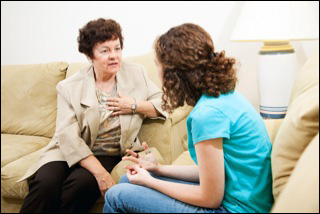 School counselors work with all students, including those with disabilities. Though the counselor may not participate in every IEP meeting, he or she does need to be aware of the services for a student with a disability. School counselors might work with a student in counseling to address issues that interfere with his or her educational success. Counselors communicate with families and other agencies, as well as assisting general educators in inclusive settings with issues related to behavior and classroom management. Counselors further work with students on issues of mental health and post-secondary transition planning such as the transition to work or college.
School counselors work with all students, including those with disabilities. Though the counselor may not participate in every IEP meeting, he or she does need to be aware of the services for a student with a disability. School counselors might work with a student in counseling to address issues that interfere with his or her educational success. Counselors communicate with families and other agencies, as well as assisting general educators in inclusive settings with issues related to behavior and classroom management. Counselors further work with students on issues of mental health and post-secondary transition planning such as the transition to work or college.
For more information on school counseling and students with disabilities, view the following IRIS Modules:
Early Identification and Assessment of Disabilities in Children
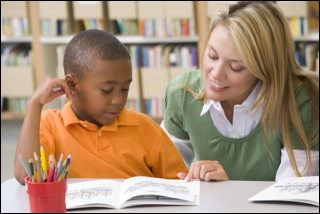 Many young children receive special education services under the disability category of developmental delay. Their need for individualized services is clear, even though their disability is not readily identifiable. As a related service, early identification and assessment of disabilities in children requires the implementation of a formal plan to identify the child’s specific disability as early in their life as possible. In order for a student to benefit from his or her special education program, an IEP team can establish a written plan, as part of the IEP, to outline the process to undertake to help identify that student’s disability.
Many young children receive special education services under the disability category of developmental delay. Their need for individualized services is clear, even though their disability is not readily identifiable. As a related service, early identification and assessment of disabilities in children requires the implementation of a formal plan to identify the child’s specific disability as early in their life as possible. In order for a student to benefit from his or her special education program, an IEP team can establish a written plan, as part of the IEP, to outline the process to undertake to help identify that student’s disability.
Interpreting Services
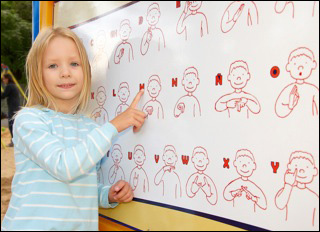 This related service area offers support to students who are deaf or hard of hearing so that they can access their educational program. It includes a range of services, such as oral language, cued language, or sign-language transliteration services, and transcription services like communication access real-time translation (CART). It further includes special interpreting services for students who are deaf-blind.
This related service area offers support to students who are deaf or hard of hearing so that they can access their educational program. It includes a range of services, such as oral language, cued language, or sign-language transliteration services, and transcription services like communication access real-time translation (CART). It further includes special interpreting services for students who are deaf-blind.
oral transliterator
glossary
cued speech transliterator
glossary
sign language transliterator
glossary
Communication Access Realtime Translation (CART)
glossary
Medical Services (for diagnostic or evaluation purposes)
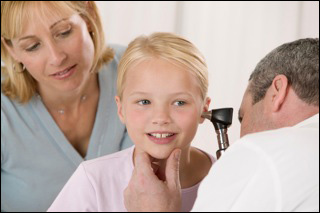 Medical services qualify as a related service when used for diagnostic or evaluation purposes only. This is a related service only when provided by a licensed physician to determine a child’s medically related disability and the need for special education and related services.
Medical services qualify as a related service when used for diagnostic or evaluation purposes only. This is a related service only when provided by a licensed physician to determine a child’s medically related disability and the need for special education and related services.
Orientation and Mobility Services (O & M)
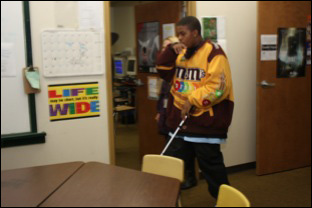 These services are provided as needed for students who are blind or have low vision to orient and assist the student in moving safely around the school or school-related environments.
These services are provided as needed for students who are blind or have low vision to orient and assist the student in moving safely around the school or school-related environments.
For more information on orientation and mobility view the following IRIS Modules:
Parent Counseling and Training
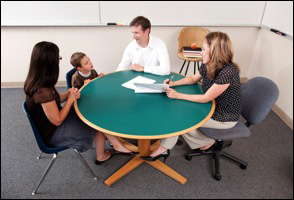 This related service is geared toward assisting parents to better understand the special needs of their child and to assist them with information that can help their child be more successful in academic and other environments (e.g., home, community). This service may be provided by a variety of professionals such as special education teachers, therapists, or behavior specialists.
This related service is geared toward assisting parents to better understand the special needs of their child and to assist them with information that can help their child be more successful in academic and other environments (e.g., home, community). This service may be provided by a variety of professionals such as special education teachers, therapists, or behavior specialists.
Recreation, Including Therapeutic Recreation Services
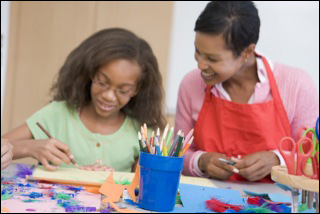 This related service area involves assessing leisure functions, both in school (during the school day and in after-school programs and activities) and in the community, for the purpose of helping students with disabilities to learn to use their leisure time in a constructive way. Therapeutic recreation involves the use of sports, games, arts and crafts, music, dance, drama, and non-traditional recreation activities to improve or maintain the physical, mental, and emotional well being of students who receive special education services. Therapeutic recreation specialists assist students with disabilities to benefit from education and improve their quality of life.
This related service area involves assessing leisure functions, both in school (during the school day and in after-school programs and activities) and in the community, for the purpose of helping students with disabilities to learn to use their leisure time in a constructive way. Therapeutic recreation involves the use of sports, games, arts and crafts, music, dance, drama, and non-traditional recreation activities to improve or maintain the physical, mental, and emotional well being of students who receive special education services. Therapeutic recreation specialists assist students with disabilities to benefit from education and improve their quality of life.
Rehabilitation Counseling Services
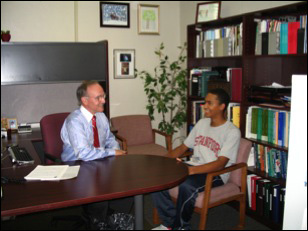 These related services, often called vocational rehabilitation services, focus on career development and preparing students for employment, independence, and integration into a post-secondary school, work, or community environment.
These related services, often called vocational rehabilitation services, focus on career development and preparing students for employment, independence, and integration into a post-secondary school, work, or community environment.
School Health Services and School Nursing Services
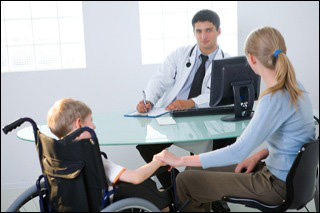 School health services are services that may be provided by either a qualified school nurse or other qualified person. School nurse services are those provided by a qualified school nurse. Such services might include medication administration; ensuring that students with disabilities have a written emergency plan for such things as medical emergencies (e.g., asthma attack, seizure) and for non-medical emergencies (e.g., evacuation in case of fire, tornado procedures).
School health services are services that may be provided by either a qualified school nurse or other qualified person. School nurse services are those provided by a qualified school nurse. Such services might include medication administration; ensuring that students with disabilities have a written emergency plan for such things as medical emergencies (e.g., asthma attack, seizure) and for non-medical emergencies (e.g., evacuation in case of fire, tornado procedures).
For more information on school nursing services, view the following IRIS Modules:
Transportation Services
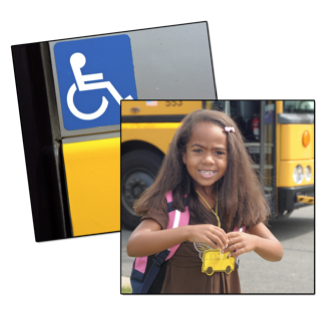 Transportation involves moving a student with a disability to and from school as well as travel in and around school buildings. It also includes any necessary specialized equipment for travel. If a student’s disability makes it difficult to get him or her to school in the same manner as a student without disabilities in the same circumstances then transportation may be an appropriate related service.
Transportation involves moving a student with a disability to and from school as well as travel in and around school buildings. It also includes any necessary specialized equipment for travel. If a student’s disability makes it difficult to get him or her to school in the same manner as a student without disabilities in the same circumstances then transportation may be an appropriate related service.